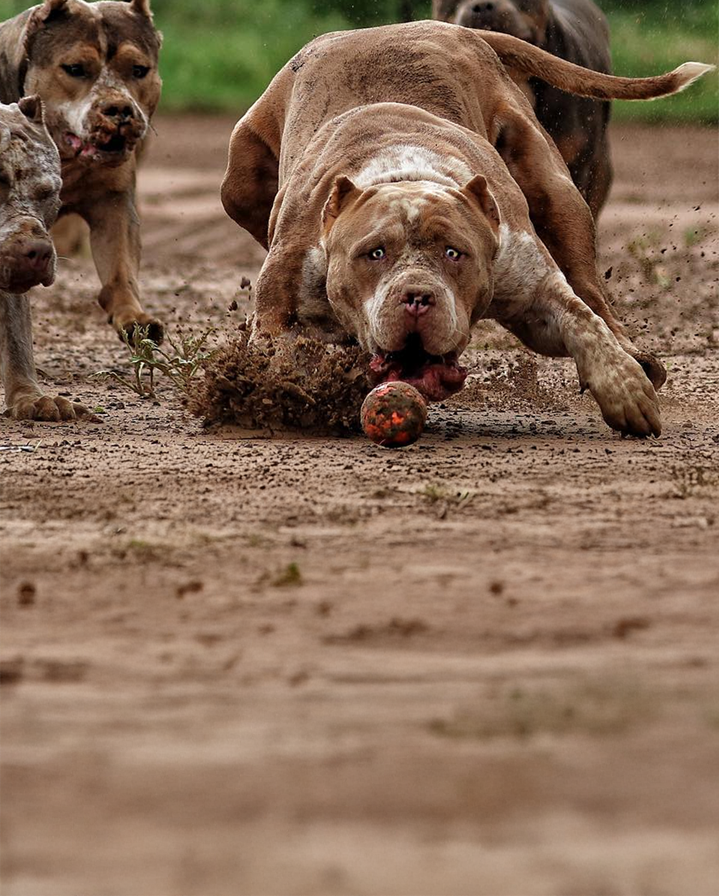10 Best Service Dog Breeds for PTSD and Anxiety

Well-trained service dogs are like four-legged heroes. They’re invaluable allies for a variety of mental, emotional, and physical health challenges.
Here at Bully Max, we know that many of you are also nothing short of heroic. We have a lot of customers who are veterans facing PTSD and other challenges.
Because service dogs can have such a positive impact on their owners’ quality of life, we decided to put together this guide to help you decide what breed of service dog is right for your unique needs.
From emotional support to medical response, from wheelchair assistance to hearing dogs for the deaf, there are a lot of different roles and jobs that service dogs can take on.
Let’s have a look at the different types of support dogs and find out the easiest dog breeds to train to be a service dog. We’ll also talk about what traits and breeds are best suited for the job.
What is a Service Dog?
A lot of people with disabilities use a service dog to better function and participate in everyday life. The ADA’s definition of a service dog is a dog that has been specifically trained to perform certain tasks for an individual with a disability. The tasks the dog performs are directly related to the person’s disability.
Different Types of Service Dogs
Though you may hear people lump them all together, support dogs actually fall into 3 different categories (with some overlap here and there). You have therapy dogs, emotional support dogs, and service dogs.
Therapy Dogs
Therapy dogs help to relax people who are experiencing stress and anxiety. The best therapy dogs can really brighten a room and help those around them to feel more peaceful.
Therapy dogs are generally used to calm down other people, not the owner of the dog. You will often see them spreading their love at nursing homes and assisted living centers. Therapy dogs also visit hospitals to comfort patients and stressed-out visitors. You may even see them comforting travelers at airports.
Emotional Support Dogs
Emotional support dogs help their owners to cope with emotional difficulties, such as PTSD, depression, and anxiety. The simple presence and company of a loving dog can have a healing effect.
Dogs have a beautiful innocence to them, and the natural companionship of an emotional support dog can be beneficial to those suffering from mental or emotional trauma. Some of the best emotional support dogs can even be trained to recognize when their owner is experiencing a panic attack or traumatic episode, and intervene with extra love.
Service Dogs
Service dogs are trained to carry out important tasks for people with disabilities. These tasks vary from helping to guide a blind owner down the street to alerting a deaf owner of important sounds such as fire alarms, doorbells, and ringing telephones.
It’s amazing, really, that certain dogs can be trained to assist their owners in so many different ways. Good service dogs can help those in wheelchairs with daily tasks like opening doors, and can even help in monitoring their owner’s blood sugar levels!
Of the 3 types of support dogs, service dogs are offered the most legal protection through the Americans with Disabilities Act (ADA). As a result, people with service dogs can take them just about anywhere, and they cannot legally be denied access.
Top Traits to Look For in Service Dogs
Let’s have a closer look at some of the common traits that all good service dogs should have.
Friendly Nature
It’s important that your service dog be friendly and not overly protective.
Sometimes your dog will be required to navigate through crowded and potentially loud and chaotic environments. It’s important for your service dog to maintain composure and not get distracted while around other people and animals.
Strong Desire to Help
Some dogs, depending on their breed, have a strong drive to help out and be put to work. Some of the other cute canines out there, well, not so much.
This is not always a big deal if you’re seeking an emotional support dog. However, if you’re looking for a service dog—which will be required to help out with crucial tasks on a regular basis—it’s important to select a dog with a strong desire to help.
Bonds Emotionally
You want a dog that will form a strong emotional bond with its owner. You and your service dog will depend on each other, and it’s important to choose a dog you can rely on.
Some dog breeds have a more independent nature. You wouldn’t want a pup that is overly protective, but it is important to select a breed that forms a strong bond with its owner.
Calm Behavior
Service or support dogs should be cool, calm, and collected. The best service dogs are not too excitable or reactive to other pets or people in public.
You never know how other people’s pets will behave in public settings. Good service dogs know to avoid other pets that are too hyper or distracting.
10 Best Service Dog Breeds
There are certain traits that make particular dog breeds really stand out when it comes to helping with various emotional or physical traumas and illnesses. Your specific needs will help you to determine what type of service dog breed is the best fit for you.
Here’s our list of the top 10 best service dog breeds, along with their common characteristics and the type(s) of service they typically provide.
1. Golden Retriever

Golden Retrievers have a good work ethic and a calm, gentle nature. Thanks to their intelligence, they’re fast learners. Intelligence, of course, will be a recurring theme among the best service dog breeds.
They’re also very sweet, and non-intimidating for their larger size, which you may want to consider when it comes to a dog that will accompany you to all sorts of public places. Golden Retrievers are perfect for emotional therapy assistance. They are also really great with small kids and children. You won’t be surprised to hear that they are often used to assist with caring for autistic children.
Gold retrievers are also one of the best service dog breeds for PTSD, and are often the go-to dog for veterans dealing with this condition.
One thing to keep in mind is that Golden Retrievers do shed a fair amount, so if you have allergies you may want to consider another furry friend for the job.
2. Pomeranian

As far as small service dogs go, the Pomeranian is perfect! You wouldn’t select them for tasks that require too much strength or size, but they are great for a number of support and service-related jobs. They excel as medical alert dogs, for example.
Pomeranians form strong emotional bonds with their owners and they’re very smart. Their small size can even have upsides. For example, in certain situations they can be more convenient to bring with you to public places. They also may do better than a larger dog in small apartments.
3. Labrador Retriever

Labrador Retrievers are one of the best breeds for mobility service. They’re gentle and can also be quite strong. Friendly yet focused, they want to help you out in any way that they can. They’re highly intelligent, and they make versatile helpers.
Labs make excellent guide dogs, hearing dogs, and emotional support dogs. You won’t be surprised to hear that they also excel at retrieving objects for their owners, due to their light and gentle grip when fetching items.
The great thing about Labs is that they offer a wonderful balance between being calm yet driven and motivated to help.
4. German Shepherd

When you think of service dogs, German Shepherds might be the first breed to come to mind. German Shepherds check off essentially all the boxes of what makes a great service dog; they’re fast learners, intelligent, and form strong emotional bonds with their owners.
They have proven to be great guide dogs, and they have a keen sense of smell—which is needed for monitoring their owners’ blood sugar levels. They even make wonderful psychiatric service dogs.
5. Pit Bulls

Pit Bulls make fantastic service and support dogs. You will be happy to hear that the unjustified stigma that used to surround Pit Bulls is finally starting to fade away. They are tremendously loving and kind animals, not to mention highly intelligent and hard-working.
They are fast learners, and when it comes to service dogs they are as versatile and as useful as it gets.
6. Border Collies

You will be hard-pressed to come across a breed more intelligent than the Border Collie. They are loyal, obedient, and as hardworking as they come. They are also valued as seizure alert dogs, as they have a knack for detecting seizures before they come on.
Border Collies are very high-energy, and they almost NEED a job to do. As a result, they make wonderful service dogs. They do have a restless nature, so they aren’t content with simply lounging around all day.
They are, however, extremely loving, so they would make a great emotional support dog, as long as you’re able to get them an adequate amount of exercise (which is a lot!).
7. Great Dane

Great Danes are strong and gentle giants. This makes them great with mobility support and helping their owners to stand up or walk.
They are also super loving, and they do well in public settings. They aren’t too excitable, and they are an excellent choice for a support dog.
(Just watch out for the drool!)
8. Bernese Mountain Dogs

Bernese Mountain Dogs are another excellent option. Their combination of intelligence and strength is impressive. You certainly would not be disappointed with a Bernese Mountain Dog for a larger service dog.
They are ideal for wheelchair assistance, opening doors, and a variety of emergency medical situations.
Just keep in mind that they are somewhat high-energy dogs, and they do shed quite a bit. They are typically better suited for cooler climates.
9. Poodle

Surprised to see poodles on the list of best service dog breeds?
In fact, poodles make for excellent support dogs. One of the top therapy dog breeds, they are also smart and hard-working. You would appreciate your poodle’s loyalty and their ability to learn complex tasks.
Poodles are great therapy dogs and emotional support dogs. They are known for their keen sense of smell as well. They’re wonderful at helping to detect allergens.
And, perhaps surprisingly, they don’t shed much!
10. Boxer

Boxers are yet another great service dog breed that has all the vital traits of a great companion. They are strong, yet kind and self-aware. (And cute!) They’re eager to help. That being said, they are moderately high-energy dogs.
If you’re looking for a great support dog for your children, you should definitely consider getting a Boxer. Just remember that they do need a lot of exercise.
Do You Have a Support or Service Dog?
If so tell us about it in the comments section! We love connecting with support dog owners.
And there you have it. A good service dog can do so much to improve your quality of life. In some situations they can even mean the difference between life and death.
Keep in mind that although these are helpful suggestions, there is no set-in-stone code here, and it’s okay to stray from this list. Any breed of dog has the potential to be a good service dog, given they have the right temperament and the proper training.
If you do have a support dog, or plan to get one, you’ll want to check out our high protein dog food. Perfect for service dogs, it’s a high-performance dog food with 100% natural, human-grade ingredients (and full label disclosure). It’s suitable for dogs of any breed or age, and we guarantee that your support dog will love it.









8 comments
Starting therapy dog training for my chocolate lab in 2 weeks! He’s so smart and sweet! I’m sure he’ll excel in training and I’m psyched to start this new journey with him!
I have a emotional support dog, an unusual one as a matter of fact. She’s a chihuahua! She LOVES EVERYONE! And is attached to me like velcro most of the time. Typically the only place I don’t take her is the grocery store. Everywhere else she goes. Especially the Dr office as I get a little tense. I had hoped to find her a friend that fit into our home but it’s proving very challenging! Good luck to everyone looking for a friend to help them and be sure to look for that diamond in the rough breed!
Thank you for your kind words and for sharing your experience with your American Staffordshire Terrier. It’s heartening to hear how he has been an incredible support in your daily life. Your efforts in educating others about the true nature of Bully breeds are commendable. Stories like yours are vital in breaking down the misconceptions and ignorance surrounding these breeds. By highlighting their loyalty, intelligence, gentleness, and trainability, we can continue to change perceptions and show the world the valuable role they can play as service dogs. Keep up the great work!
I enjoyed your article. I commend you for including pitbulls on this list. My service dog is an American Staffordshire Terrier and he’s amazing. He helps me function daily. I want people to be educated and informed when it comes to Bully breeds. The misconceptions and ignorance about these breeds still exist. Every day I try educating people on how wonderful they are. They are loyal, smart, gentle, and can be easily trained. Thank you for the read.
I have a PTSD service dog who is a Bernese Mountain Dog-mix and he’s a perfect PTSD service dog…His constant eye contact and his love for being around his humans make him ideal for a ptsd service dog. We have developed an unbreakable bond and i don’t know where i’d be without him. You definitely nailed it with this dog breed being a top contender for PTSD service dogs!